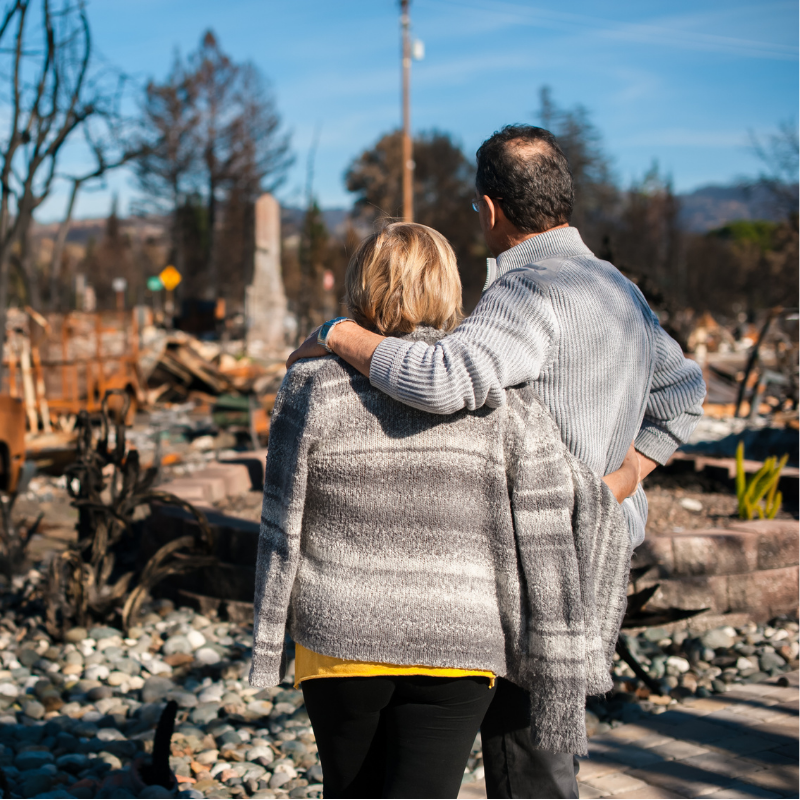Scammers love natural disaster headlines. These bad actors view devastating news of hurricanes, wildfires, and other catastrophes as opportunities to line their pockets. While federal, state, and local assistance can take days or weeks to arrive, con artists are rushing to profit from someone else's misfortune by intercepting financial aid and other needed resources. But you can avoid natural disaster scams with a few simple tactics of your own.
Get your insurance company involved
Home repair scammers will tell you there’s no need to file an insurance claim for repairs. They often do this to discourage you from speaking with someone who will ask questions about their company. To build trust, crooks will often share false endorsements from neighbors who recently signed up for their services. Fake social pressure is often used to convince you to ignore your better judgment.
Before you agree to any repair or restoration work, speak with your insurance company. They may need to approve the work before processing the claim.
Say "No" to limited-time discounts for cash payments
Fraudsters will pressure you by making false promises to get you to "act now" and pay in cash. They might even tout limited-time discounts or throw in additional services for free despite no written estimate. These are all red flags. After you pay a deposit or the total fee, the scammer will disappear.
Even if your insurance policy covers the work on your home, make sure the business you plan to hire has a valid business license, proof of insurance, and is in good standing with the Better Business Bureau.
Ask for identification
Con artists will impersonate government officials and insurance representatives to get you to trust them. They often initiate contact, hoping to steal your Social Security number and gain access to your financial accounts. They'll say that private data is needed so they can ensure claim checks are sent to the correct person or deposited into the right bank account. Don't fall for this common excuse.
Most disaster recovery officials know about impersonation scams and have no problem presenting identification. However, if someone fails to offer their identification, ask for it. If they refuse to provide it, it’s probably a scam.
Remember that government assistance is free
There's no charge to receive federal disaster assistance from a legitimate government agency. For example, the Federal Emergency Management Agency (FEMA) does not charge an application or processing fee to receive federal financial assistance. Scammers will falsely claim your application won't be submitted for review unless you pay them the required fee.
Never pay to qualify for federal assistance.
Donate directly to charitable agencies
While primary targets are natural disaster victims, con artists also attempt to steal from compassionate individuals making charitable contributions to nonprofits assisting with recovery efforts. Scammers will create fake text-to-donate numbers claiming to represent well-known nonprofit organizations. Unfortunately, the money never reaches those who need it most. Instead, the scammer funnels all the money into their own bank account.
Don't click on hyperlinks found in text messages or emails. Instead, avoid charity scams by typing the URL of your preferred nonprofit into your browser and find ways to donate on the website. Confirm any text-to-donate numbers so your money goes to the intended party.
Ensure temporary housing is legitimate
When you need a place to stay while your home is being repaired or rebuilt, it makes sense to search for a short-term rental property within your budget. Scammers know that natural disaster victims are typically low on funds, so they'll try to entice them with below-market rental rates. Once they've hooked a potential renter, they'll give excuses why they can't meet in person to show the property.
If they have you sign a lease, it could be for a property they do not own or do not have permission to sublease. Payment will be required in cash or via a digital payment app, like Zelle, before you've even received a tour or signed a lease.
Steer clear of rental listing scams by insisting on an in-person or video tour before signing documents or paying money to secure the unit. If the person renting the property only communicates via app, text, or email, this could be a sign of a scam.
Google the name of the property owner or manager along with the address. The names should match the rental property address. You can also search the tax collector's office in your jurisdiction to confirm the names of the legal owners of the property.
Protect yourself and others in your community by reporting suspected natural disaster scams to federal and state authorities. Call the FEMA Disaster Fraud Hotline at 1-866-720-5721. Search for your state attorney general's office at the National Association of Attorneys General.
Others are reading:
- Emergency Savings Accounts: 5 Places to Stash Your Cash
- How to Prevent Catalytic Converter Theft
- 5 Ways to Fight Inflation
- When Money is Tight, Prioritize Your Bills
- What to Do When You're in a Credit Crisis




.jpg)

-2.png)







Comment